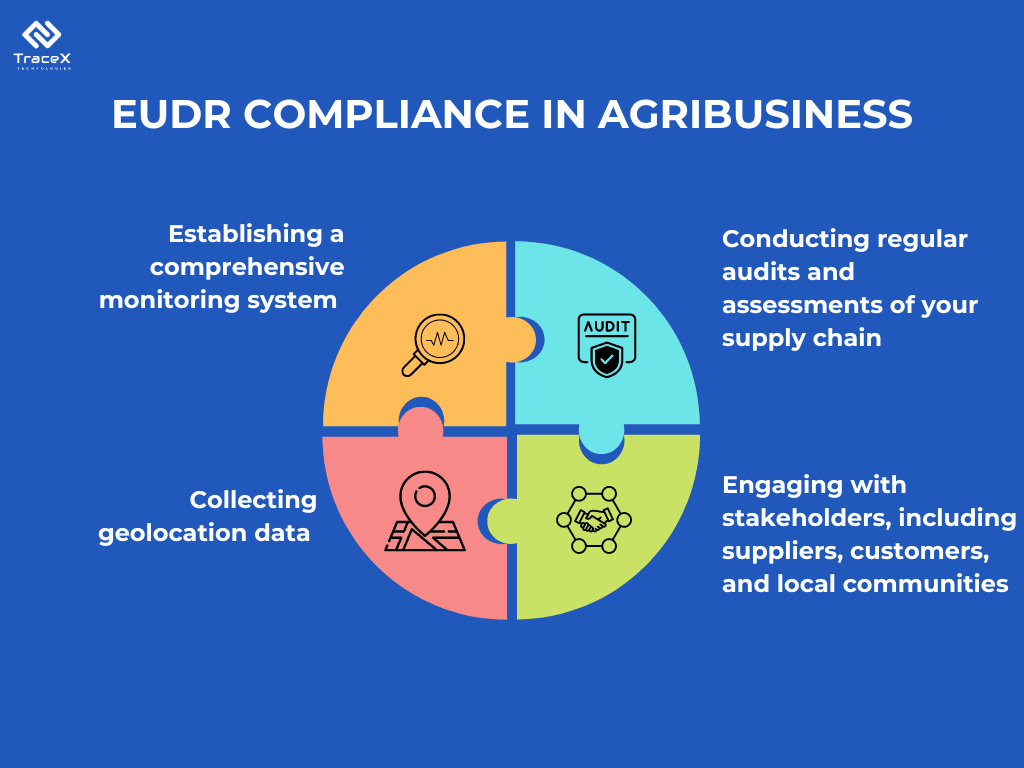Contact: +91 99725 24322 |
Menu
Menu
Quick summary: Discover how to prepare your agribusiness for future EUDR regulations. Learn about the top challenges, leverage technology for compliance, and master monitoring and reporting techniques with our comprehensive guide.

The EUDR Compliance in agribusiness is reshaping the landscape and compelling companies to ensure their products are sourced without contributing to deforestation. The clock is ticking for agribusinesses to comply with the EU Deforestation Regulation (EUDR), but many are still grappling with the complexities of ensuring their supply chains are deforestation-free. The stakes are high—non-compliance can lead to costly penalties, disrupted exports, and damage to your brand’s reputation.
Navigating the strict EUDR requirements can feel overwhelming, especially for companies with global supply chains spanning multiple tiers and locations. How do you trace every product back to its origin and ensure compliance at every step? We’ll explore best practices to help you confidently meet EUDR standards, streamline your processes, and stay ahead of the curve.
Key Takeaways
The EU Deforestation Regulation (EUDR) is a new law aimed at combating global deforestation by ensuring that products entering the European market are not contributing to environmental destruction. For agribusinesses, this means adhering to strict rules that guarantee their products are deforestation-free.
At its core, the EUDR is part of the EU’s commitment to tackle deforestation and forest degradation, both major contributors to climate change and biodiversity loss. The regulation sets out clear due diligence requirements for businesses that export specific commodities to the EU. Simply put, the EU wants to ensure that the products reaching its markets are not linked to the destruction of forests.
The EUDR is not just a set of guidelines — it’s legally binding. If an agribusiness fails to comply, it could face severe penalties, including fines and restrictions on trading with the EU.
For agribusinesses, particularly those dealing in commodities like soy, beef, palm oil, coffee, cocoa, wood, and rubber, the EUDR means implementing traceability and transparency at every level of their supply chain. If you’re sourcing or producing any of these commodities, the EU wants to know where they come from, down to the specific plot of land.
It’s not enough to say your products are deforestation-free; you must prove it. The regulation requires businesses to trace their commodities back to their point of origin and ensure that the land has not been deforested after December 31, 2020. This is a key challenge for many agribusinesses, as supply chains are often complex, involving multiple layers of suppliers and locations.
The regulation focuses on seven key commodities:
In addition, products made from or containing these commodities, like leather from cattle or chocolate made from cocoa, also fall under the regulation. Even processed items such as furniture made from wood or foods that contain palm oil are affected.
Agribusinesses must conduct thorough checks to ensure that none of their products are linked to deforestation. If you’re in the business of producing or trading these commodities, the responsibility to ensure compliance is on your shoulders.
The EUDR is already in motion, with businesses expected to comply by **2025**. Here’s a rough timeline of what’s coming:
2023-2024: This is the transition period, where agribusinesses must assess their current supply chains and start implementing due diligence processes.
2025: Full compliance with the EUDR is mandatory. By this time, businesses must be able to prove that their products are not connected to deforestation, using tools like geolocation data and verified supply chain transparency.
Businesses that fail to comply by 2025 risk facing fines, exclusion from the EU market, and reputational damage.
To sum it up: if your agribusiness is involved in the production or export of any of the EUDR-regulated commodities, now is the time to take action. You’ll need to audit your supply chains, ensure transparency, and invest in tools that help track product origins. Compliance isn’t just a regulatory hurdle — it’s an opportunity to align your business with the global push for sustainability and position yourself as a responsible, future-ready company.
Navigating the complexities of the EU Deforestation Regulation (EUDR) can feel daunting for agribusinesses, especially with the pressure to meet stringent compliance requirements. However, with the right approach, EUDR compliance becomes an opportunity to strengthen your operations, build trust with consumers, and contribute to the global fight against deforestation.
Here are five best practices to ensure your agribusiness stays on track with EUDR compliance:
1: Implement End-to-End Traceability
In today’s interconnected world, traceability is more than a buzzword—it’s a necessity. For EUDR compliance, agribusinesses need to prove exactly where their products come from, ensuring that no deforestation has occurred after December 31, 2020. To achieve this, companies should implement end-to-end traceability.
One of the most effective ways to do this is by leveraging blockchain technology or digital traceability platforms. These tools can track a product’s journey from farm to fork, ensuring transparency at every step. By storing data in a decentralized ledger, blockchain guarantees the integrity of information, making it nearly impossible to tamper with. Whether it’s tracing the origin of soybeans back to a specific farm or tracking cattle from birth to slaughter, blockchain provides a clear and verified record of the product’s origins.
Pro Tip: Invest in a digital traceability platform that integrates with your current systems. This ensures seamless tracking and reporting while keeping your operations smooth and efficient.
2: Supplier Due Diligence and Collaboration
No business operates in a silo, especially in agriculture where supply chains often span multiple tiers of suppliers. Ensuring that every supplier, from the farmer to the final processor, is adhering to EUDR standards is critical.
This means conducting thorough due diligence at every level. Start by mapping out your supply chain, identifying high-risk areas where deforestation could occur. Then, collaborate with your suppliers to ensure they meet EUDR requirements, providing them with the necessary training and tools to help them become compliant.
Building strong relationships with your suppliers is key. Open lines of communication allow you to address potential issues before they escalate. Encourage suppliers to adopt sustainable practices and provide incentives for those who maintain high standards of compliance.
Tip: Consider using supplier portals or collaborative platforms to maintain regular communication, share compliance guidelines, and track supplier performance.
3.Deforestation Risk Monitoring and Mitigation
Effectively managing deforestation risks in your supply chain is crucial for compliance with EUDR regulations. Digital tools are essential for gathering and analyzing the data needed to mitigate these risks.
Utilize satellite monitoring solutions such as satellite imaging, IoT sensors, and AI-powered analytics to track land-use changes and detect potential deforestation activities. These technologies enable you to continuously monitor geolocation data and assess risks across your supply chain, providing early warnings and actionable insights.
When it comes to compliance reporting, choose platforms with integrated reporting tools that streamline documentation processes and ensure accuracy. This helps reduce the manual effort involved and keeps your reporting up-to-date with EU requirements.
Tip: Opt for platforms that offer real-time dashboards. These can provide instant visibility into your deforestation risk status, help you generate reports quickly, and allow you to proactively address risks before they escalate.
4: Regular Audits and Compliance Checks
Once your systems are in place, the next step is to ensure that compliance is maintained over time. This is where regular audits and compliance checks come in.
Periodic audits are essential for identifying any potential gaps or weaknesses in your processes. They also help ensure that your suppliers are keeping up with EUDR standards. Internal and external audits provide you with the reassurance that your products are fully compliant and ready for the EU market.
Conducting audits also shows your commitment to transparency and sustainability, which can enhance your reputation with consumers and stakeholders alike.
Tip: Develop a structured audit schedule and ensure all relevant team members are involved. Consider partnering with third-party auditors for unbiased evaluations of your supply chain
5. Sustainable Procurement Strategies
Integrating sustainable procurement strategies ensures that sourcing decisions are aligned with environmental, social, and governance (ESG) principles. Agribusinesses can prioritize suppliers that meet both EUDR and sustainability goals, ensuring that commodities are sourced responsibly. Sustainable procurement not only helps businesses remain compliant but also strengthens their reputation and resilience in a global market increasingly focused on sustainability.
Tip: When implementing sustainable procurement strategies, prioritize working with local suppliers and those certified by recognized sustainability standards (e.g., Rainforest Alliance, Fair Trade).
EUDR compliance may feel like a big task, but with the right tools, strategies, and a focus on collaboration, your agribusiness can turn it into an opportunity for growth and innovation. By implementing best practices like end-to-end traceability, supplier collaboration, digital monitoring, and training, you can not only comply with regulations but also position your business as a sustainability leader in the market.
Technology plays a pivotal role in helping agribusinesses navigate the complexities of EUDR compliance.
Implementing digital traceability solutions can simplify the process of tracking products from farm to market. These solutions use blockchain technology to create an immutable record of each transaction, ensuring transparency and accountability.
Remote sensing technology and satellite monitoring can help agribusinesses identify deforestation activities in real-time. By utilizing these tools, companies can monitor land use changes and assess the sustainability of their sourcing practices.
Advanced data analytics can enhance risk assessment processes by analyzing large datasets to identify potential compliance issues. By leveraging predictive analytics, agribusinesses can proactively address risks before they escalate.
Automating the reporting process can save time and reduce the risk of errors. By implementing systems that generate compliance reports automatically, agribusinesses can ensure they meet regulatory requirements without the administrative burden.

The TraceX EUDR Compliance platform is a cutting-edge digital solution designed to help agribusinesses seamlessly meet the stringent requirements of the EU Deforestation Regulation (EUDR). Built on blockchain technology, the platform enables end-to-end traceability of products, ensuring transparency and verifiable data across the supply chain. From farm-level origins to the final product, TraceX provides real-time insights and comprehensive tracking, making it easier to monitor deforestation risks, engage with multiple suppliers, and ensure compliance at every stage. Additionally, the platform’s intuitive interface offers automated reporting features, allowing businesses to efficiently submit compliance documentation and stay audit-ready. With TraceX, companies not only avoid the risks of non-compliance but also enhance their sustainability efforts, strengthening their market presence and consumer trust.
The platform also leverages satellite monitoring tools for real-time deforestation risk assessment, offering agribusinesses advanced visibility into land-use changes and environmental risks. This feature ensures accurate and proactive monitoring of deforestation activities, enabling businesses to identify and mitigate risks in their supply chains before they become compliance issues. By connecting with ERP systems, TraceX centralizes data collection and management, ensuring that compliance efforts are fully aligned with business workflows. Additionally, the platform’s compatibility with the EU-DDS ensures that all due diligence documentation, from tracking product origins to risk assessment reports, can be submitted efficiently and in accordance with regulatory requirements.
Preparing your agribusiness for future EUDR regulations is a critical undertaking that requires careful planning, investment in technology, and a commitment to sustainability. By understanding the challenges of compliance, leveraging technology effectively, and implementing robust monitoring and reporting practices, you can navigate the complexities of EUDR with confidence.
The EUDR presents both challenges and opportunities for agribusinesses. By embracing these changes and prioritizing sustainable practices, you can not only ensure compliance but also position your business for long-term success in an increasingly sustainability-conscious market. Start your journey today, and let’s work together toward a greener, more sustainable future for agriculture.
